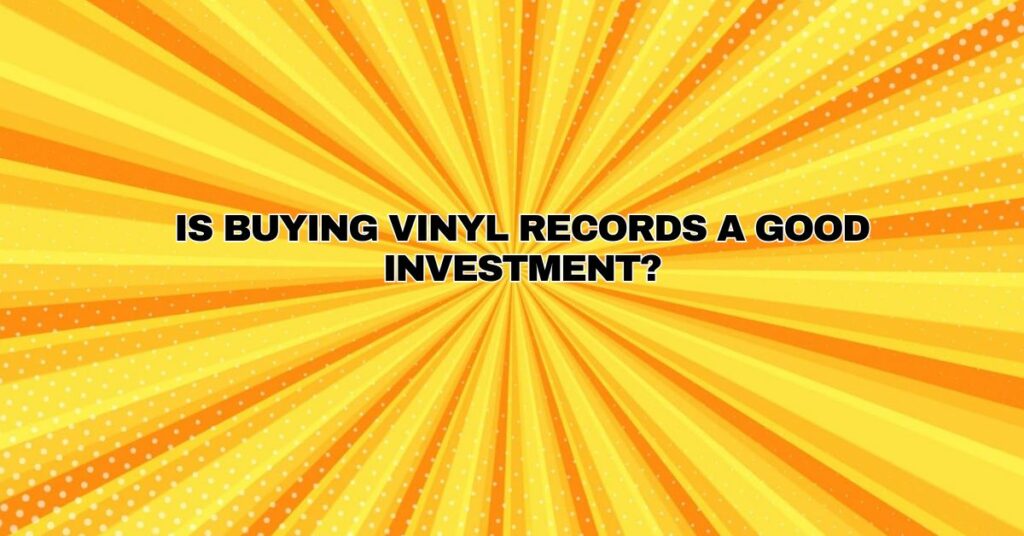Vinyl records, once thought of as a bygone relic of music history, have experienced a remarkable resurgence in popularity in recent years. Collectors, audiophiles, and music enthusiasts have flocked to the analog format, creating a thriving market for vinyl records. As the interest in vinyl continues to grow, a common question arises: Is buying vinyl records a good investment? In this article, we’ll explore the factors that can make vinyl records a potential investment and examine the considerations to keep in mind if you’re thinking of adding vinyl to your investment portfolio.
The Appeal of Vinyl Records
Before delving into the investment potential, it’s essential to understand why vinyl records hold such allure:
- Analog Warmth: Vinyl records offer a unique analog sound characterized by warmth, depth, and nuances that many audiophiles find appealing. This sonic quality has contributed to the vinyl revival.
- Tangible Experience: Vinyl records provide a tactile and immersive experience that digital formats lack. Collectors value the ritual of handling records, admiring cover art, and manually playing music.
- Historical Significance: Vinyl records carry historical and cultural significance. They have been a part of music history for decades, capturing iconic performances and moments in time.
- Collectibility: Vinyl records come in various editions, pressings, and colors, making them highly collectible. Limited releases, special editions, and rare pressings can command high prices among collectors.
- Cover Art: Vinyl album covers often feature iconic artwork that has become part of pop culture. Collectors appreciate these visual elements.
Investment Potential of Vinyl Records
While vinyl records are primarily appreciated for their intrinsic value as music carriers, there is investment potential in certain cases. Here are some factors to consider:
Rarity and Scarcity
Vinyl records become valuable when they are rare or scarce. Limited-edition releases, promotional copies, and records from niche genres can fetch high prices. Specific pressings or versions of albums may be sought after by collectors.
Condition
The condition of a vinyl record is paramount when determining its investment value. Records in mint or near-mint condition are worth considerably more than those with scratches, scuffs, or other damage. Collector-grade records must be well-preserved.
Artist and Genre
Records by iconic artists or within popular music genres are generally more likely to appreciate in value. Albums by legendary musicians or bands often remain in demand among collectors.
Historical Significance
Vinyl records that have historical or cultural significance may appreciate over time. Recordings of significant live performances, pioneering artists, or records associated with historical events can gain value.
Market Trends
The value of vinyl records can be influenced by market trends. Certain genres or artists may gain or lose popularity over time, affecting the market value of their records.
Editions and Pressings
First pressings or records with unique labels, misprints, or promotional markings are often prized by collectors. These variations can contribute to the investment potential of a vinyl record.
Considerations and Risks
While vinyl records can be a sound investment in specific cases, it’s essential to approach them with careful consideration:
- Long-Term Perspective: Investing in vinyl records should be viewed as a long-term endeavor. Records may appreciate over years or decades, not months.
- Diversification: Vinyl records should be just one component of a diversified investment portfolio. It’s not advisable to allocate a significant portion of your investments to records.
- Expertise and Research: Successful vinyl investments require expertise and extensive research. Understand the market, condition grading, and the specific records you’re considering.
- Storage and Maintenance: Proper storage and maintenance are crucial to preserving the condition of vinyl records. Improper handling or storage can lead to deterioration.
- Liquidity: Vinyl records are not highly liquid investments. Selling them may take time, and the market can be unpredictable.
Conclusion
Buying vinyl records can be a rewarding and enjoyable hobby, and in some cases, it can offer investment potential. While there are records that have appreciated significantly in value over time, it’s important to approach vinyl as an investment with caution and a long-term perspective. Research, expertise, and careful selection of records are essential. Ultimately, the value of vinyl records extends beyond their potential for financial gain; they offer a rich and immersive connection to music history and culture that is cherished by collectors and enthusiasts alike.


